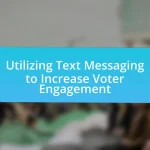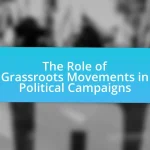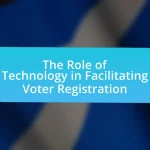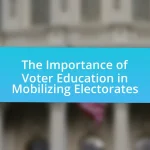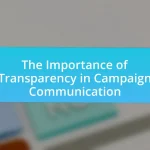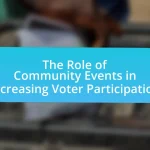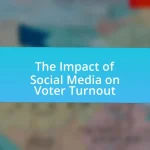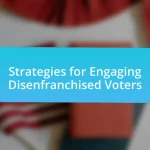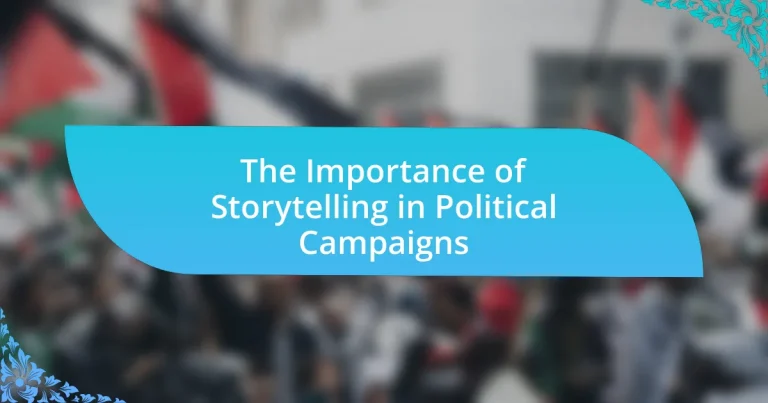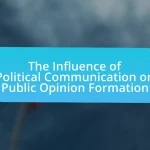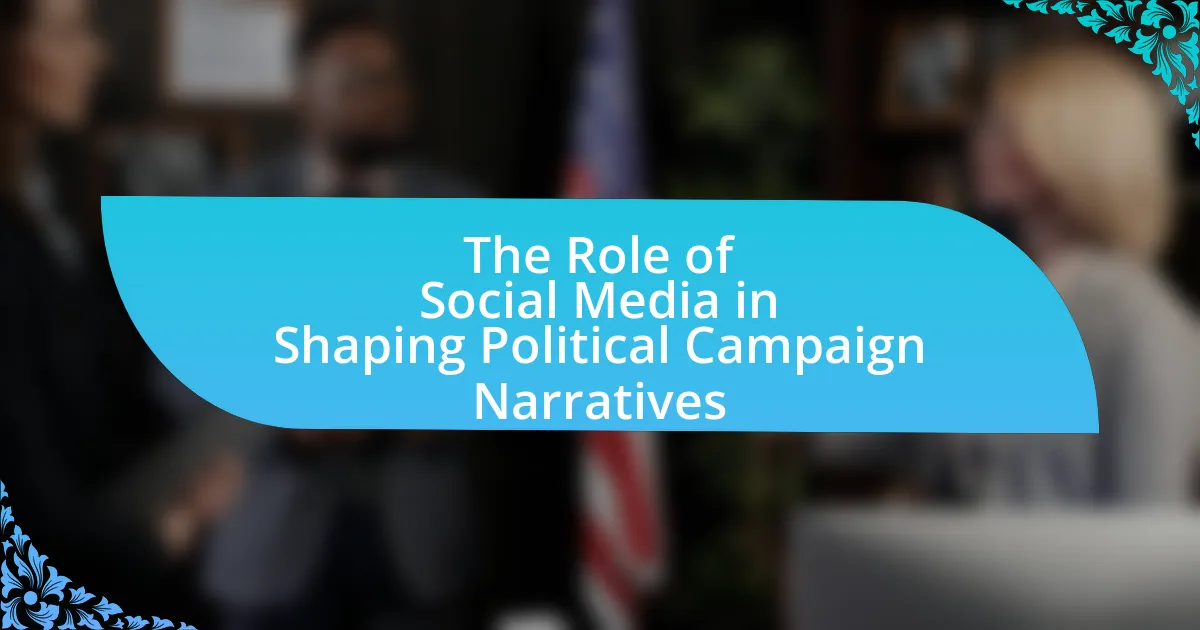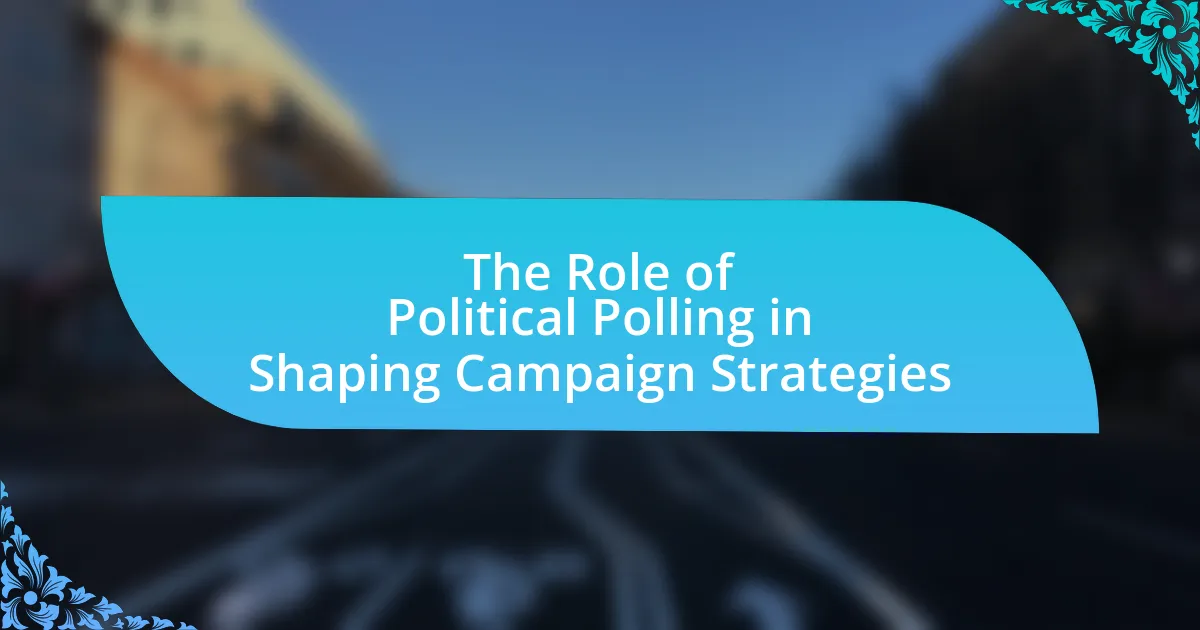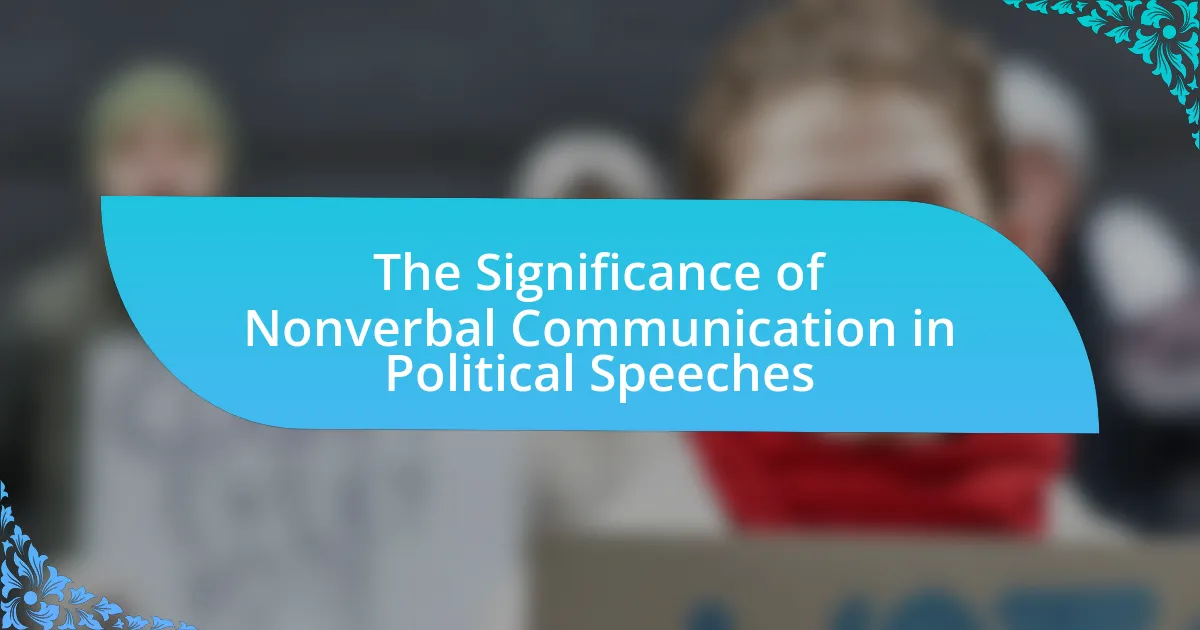The article focuses on the significance of storytelling in political campaigns, emphasizing its role in creating emotional connections with voters and simplifying complex political issues. It outlines how effective narratives can enhance voter perception, increase trust, and ultimately influence electoral outcomes. Key elements of successful storytelling include authenticity, relatability, and emotional engagement, while also addressing the challenges candidates face in crafting their narratives. The article further explores the impact of technology and social media on political storytelling, highlighting best practices for candidates to effectively engage their audience and encourage voter participation.
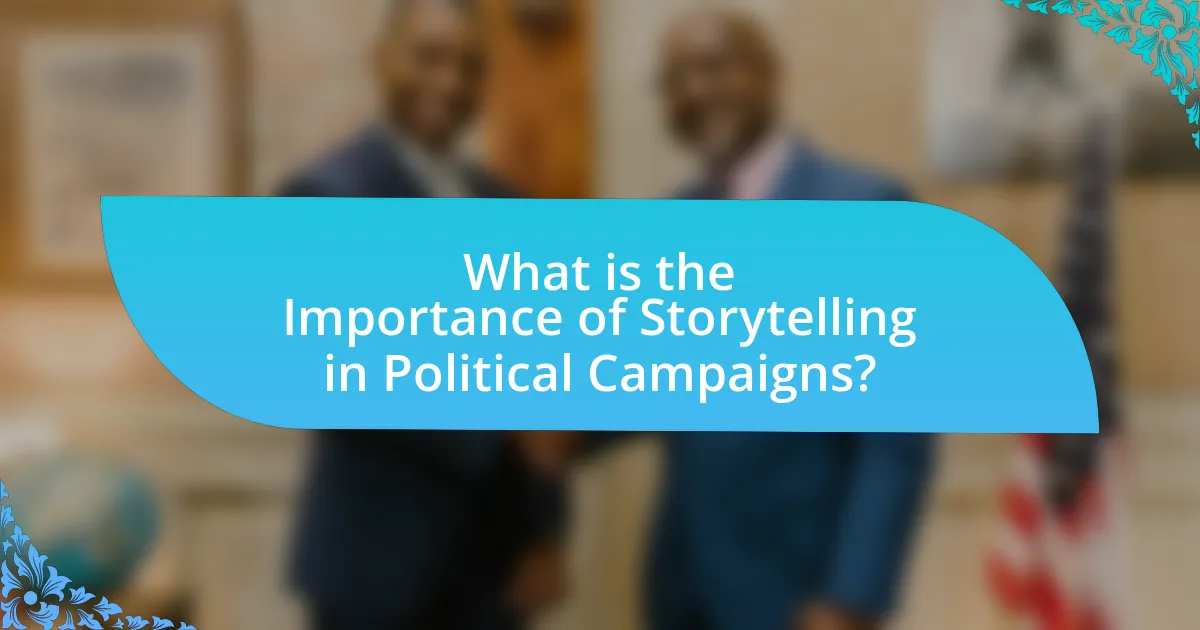
What is the Importance of Storytelling in Political Campaigns?
Storytelling is crucial in political campaigns as it helps candidates connect emotionally with voters, making their messages more relatable and memorable. Effective storytelling can simplify complex political issues, allowing candidates to convey their values and vision in a compelling manner. Research indicates that narratives can significantly influence voter perception; for instance, a study by the University of Southern California found that stories can increase the likelihood of persuasion by up to 20%. By utilizing personal anecdotes and relatable scenarios, candidates can foster trust and engagement, ultimately enhancing their chances of electoral success.
How does storytelling influence voter perception?
Storytelling significantly influences voter perception by creating emotional connections and simplifying complex political issues. When candidates share personal narratives or relatable experiences, they engage voters on an emotional level, making their messages more memorable and impactful. Research indicates that stories can enhance persuasion; for instance, a study published in the journal “Political Psychology” found that narratives can shift voter attitudes by fostering empathy and understanding. This emotional engagement often leads to increased trust and relatability, ultimately shaping how voters perceive candidates and their platforms.
What psychological mechanisms are at play in storytelling?
Psychological mechanisms at play in storytelling include emotional engagement, cognitive processing, and social connection. Emotional engagement occurs when narratives evoke feelings, making the audience more receptive to the message; studies show that emotionally charged stories can enhance memory retention by up to 65%. Cognitive processing involves the audience’s ability to relate to characters and situations, which facilitates understanding and retention of information. Research indicates that stories activate the brain’s mirror neurons, allowing individuals to empathize with characters, thereby increasing persuasive impact. Social connection is fostered through shared narratives, which can create a sense of community and belonging; this is evidenced by the fact that people are more likely to support political candidates who share relatable stories, as these narratives resonate with their own experiences.
How does storytelling create emotional connections with voters?
Storytelling creates emotional connections with voters by presenting relatable narratives that resonate with their experiences and values. When politicians share personal stories or anecdotes, they humanize themselves, making it easier for voters to identify with them. Research indicates that emotional engagement significantly influences decision-making; for instance, a study published in the Journal of Personality and Social Psychology found that emotionally charged messages are more persuasive than purely factual ones. This emotional resonance fosters trust and loyalty, as voters feel understood and valued, ultimately influencing their voting behavior.
Why is storytelling a critical tool for political candidates?
Storytelling is a critical tool for political candidates because it effectively engages voters and conveys complex ideas in relatable ways. By using narratives, candidates can connect emotionally with their audience, making their messages more memorable and impactful. Research shows that stories activate different parts of the brain, enhancing retention and understanding; for instance, a study by Paul Zak found that narratives can increase empathy and influence decision-making. This emotional connection can lead to increased voter support, as candidates who share personal stories often appear more authentic and trustworthy, which is crucial in building rapport with constituents.
What role does storytelling play in differentiating candidates?
Storytelling plays a crucial role in differentiating candidates by allowing them to connect emotionally with voters and convey their values and vision effectively. Candidates who utilize storytelling can illustrate their personal journeys, challenges, and motivations, making them more relatable and memorable to the electorate. Research indicates that narratives can enhance engagement and retention of information, as stories are processed differently in the brain compared to facts alone. For instance, a study by the University of California, Los Angeles, found that stories activate multiple areas of the brain, leading to increased empathy and understanding among listeners. This emotional connection can significantly influence voter perception and decision-making, ultimately setting candidates apart in a competitive political landscape.
How can storytelling enhance a campaign’s message?
Storytelling enhances a campaign’s message by creating emotional connections that resonate with the audience. This emotional engagement increases the likelihood of message retention and motivates action. Research indicates that narratives are more effective than statistics in influencing opinions; for instance, a study by the Stanford Graduate School of Business found that stories can increase message recall by up to 22 times compared to facts alone. By weaving personal experiences or relatable scenarios into the campaign narrative, candidates can effectively communicate their values and policies, making them more relatable and memorable to voters.
What are the key elements of effective storytelling in campaigns?
The key elements of effective storytelling in campaigns include a clear narrative, relatable characters, emotional engagement, and a strong call to action. A clear narrative provides a structured storyline that guides the audience through the campaign’s message, while relatable characters help the audience connect personally with the story. Emotional engagement is crucial as it fosters a deeper connection and motivates the audience to act. Finally, a strong call to action directs the audience on what steps to take next, reinforcing the campaign’s objectives. Research by the Harvard Business Review indicates that stories are 22 times more memorable than facts alone, highlighting the effectiveness of storytelling in engaging audiences and driving campaign success.
What types of narratives resonate most with voters?
Personal stories and relatable experiences resonate most with voters. These narratives create emotional connections, making candidates appear more authentic and trustworthy. Research indicates that voters are more likely to engage with candidates who share personal anecdotes that reflect their values and struggles, as seen in the 2008 U.S. presidential election where Barack Obama’s personal narrative significantly influenced voter perception and turnout. Additionally, narratives that highlight community issues and collective experiences foster a sense of shared identity, further enhancing voter engagement.
How can candidates tailor their stories to specific audiences?
Candidates can tailor their stories to specific audiences by understanding the values, interests, and concerns of those audiences. This involves conducting thorough research to identify what resonates with different demographic groups, such as age, socioeconomic status, and cultural background. For instance, a candidate might emphasize economic growth and job creation when addressing working-class voters, while focusing on social justice and equality when speaking to younger, more progressive audiences. Tailoring stories in this way increases relatability and engagement, as evidenced by studies showing that personalized messaging can lead to higher voter turnout and support.
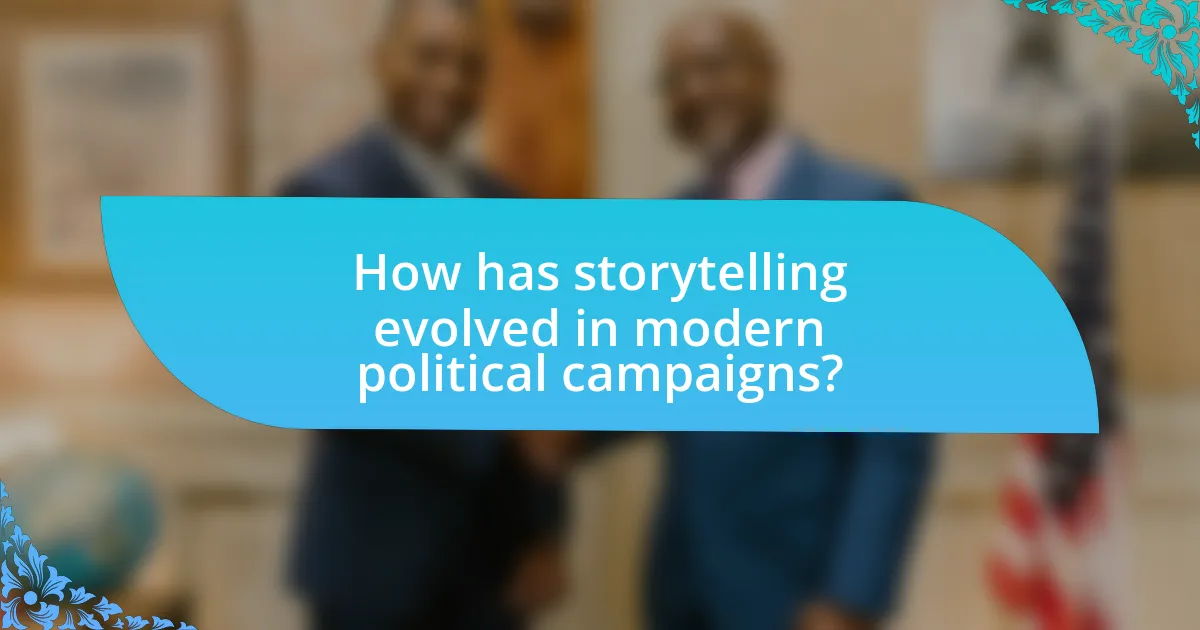
How has storytelling evolved in modern political campaigns?
Storytelling in modern political campaigns has evolved from traditional rhetoric to a more multimedia and personalized approach. Campaigns now utilize social media platforms, video content, and data analytics to craft narratives that resonate with specific voter demographics. For instance, the 2008 Obama campaign effectively used storytelling through social media to engage younger voters, showcasing personal stories that highlighted shared values and experiences. This shift reflects a broader trend where emotional connection and relatability are prioritized, allowing candidates to build a more intimate relationship with their audience.
What impact has technology had on political storytelling?
Technology has significantly transformed political storytelling by enhancing the speed, reach, and interactivity of narratives. Digital platforms enable politicians to disseminate messages instantly to a global audience, allowing for real-time engagement and feedback. For instance, social media channels like Twitter and Facebook have become essential tools for political campaigns, facilitating direct communication between candidates and voters, which was not possible in traditional media. According to a Pew Research Center study, 69% of adults in the U.S. use social media, illustrating the vast potential for political storytelling through these platforms. Additionally, technology allows for the use of multimedia elements, such as videos and infographics, which can make political messages more compelling and accessible. This shift has led to a more dynamic and participatory form of storytelling, where voters can share, comment, and contribute to the narrative, ultimately influencing public opinion and electoral outcomes.
How do social media platforms change the way stories are shared?
Social media platforms fundamentally change the way stories are shared by enabling rapid dissemination and interactive engagement. These platforms allow users to share narratives instantly with a global audience, breaking traditional barriers of time and space that previously limited storytelling. For instance, a study by the Pew Research Center found that 69% of adults in the U.S. use social media, which facilitates the viral spread of stories through shares, likes, and comments, amplifying their reach and impact. Additionally, social media encourages user-generated content, allowing individuals to contribute their perspectives and experiences, thus enriching the narrative landscape and fostering community dialogue around political issues.
What are the implications of digital storytelling for campaigns?
Digital storytelling significantly enhances campaigns by fostering emotional connections with audiences. This approach allows campaigns to convey complex messages through relatable narratives, making them more memorable and impactful. Research indicates that stories can increase information retention by up to 65%, compared to traditional data presentation methods. Furthermore, digital storytelling leverages various multimedia formats, such as videos and social media, to reach diverse demographics effectively, thereby broadening the campaign’s reach and engagement. This strategy not only humanizes candidates but also encourages voter participation by creating a sense of community and shared values.
How do successful campaigns utilize storytelling strategies?
Successful campaigns utilize storytelling strategies by crafting relatable narratives that resonate with their target audience. These narratives often highlight personal experiences, values, and aspirations, making the campaign’s message more engaging and memorable. For instance, Barack Obama’s 2008 campaign effectively used storytelling to connect with voters by sharing personal anecdotes and emphasizing themes of hope and change, which contributed to his historic election victory. Research indicates that campaigns employing storytelling can increase voter engagement and emotional connection, leading to higher levels of support and participation.
What case studies exemplify effective storytelling in politics?
Case studies that exemplify effective storytelling in politics include Barack Obama’s 2008 presidential campaign and the Brexit campaign in the United Kingdom. Barack Obama’s campaign utilized personal narratives and relatable stories to connect with voters, emphasizing themes of hope and change, which resonated widely and contributed to his electoral success. The Brexit campaign effectively employed storytelling by framing the narrative around national sovereignty and economic independence, appealing to voters’ emotions and concerns about immigration and identity. These examples demonstrate how strategic storytelling can significantly influence public perception and voter behavior in political contexts.
How can storytelling be integrated into campaign strategies?
Storytelling can be integrated into campaign strategies by creating a narrative that resonates with the target audience, effectively conveying the campaign’s message and values. Campaigns can utilize personal stories, testimonials, and relatable scenarios to engage voters emotionally, making the message more memorable. Research indicates that narratives can increase information retention by up to 65%, as they help individuals connect with the content on a personal level. By weaving storytelling into speeches, advertisements, and social media content, campaigns can foster a deeper connection with constituents, ultimately enhancing voter engagement and support.
What challenges do candidates face in storytelling?
Candidates face several challenges in storytelling, primarily related to authenticity, audience engagement, and message clarity. Authenticity is crucial; candidates must ensure their stories resonate with voters’ experiences and values, as inauthentic narratives can lead to distrust. Audience engagement poses another challenge, as candidates must tailor their stories to diverse demographics, ensuring relevance and relatability. Additionally, message clarity is vital; candidates must convey complex ideas simply and compellingly to avoid confusion and maintain voter interest. These challenges are supported by research indicating that effective storytelling in political campaigns significantly influences voter perception and decision-making.
How can candidates overcome skepticism in their narratives?
Candidates can overcome skepticism in their narratives by providing authentic, relatable stories that resonate with their audience. Authenticity builds trust; when candidates share personal experiences or challenges, it humanizes them and fosters a connection with voters. Research indicates that narratives grounded in real-life experiences are more persuasive; for instance, a study published in the Journal of Personality and Social Psychology found that storytelling can significantly enhance message acceptance. By aligning their narratives with the values and concerns of their constituents, candidates can effectively counter skepticism and create a compelling case for their vision and policies.
What pitfalls should candidates avoid in their storytelling efforts?
Candidates should avoid being overly complex in their storytelling efforts. Simplifying narratives ensures clarity and relatability, which are crucial for audience engagement. Research indicates that clear and concise messaging resonates more effectively with voters, as evidenced by a study from the Pew Research Center, which found that 70% of voters prefer straightforward communication over convoluted narratives. Additionally, candidates should steer clear of exaggeration or dishonesty, as authenticity builds trust; a Gallup poll revealed that 85% of voters value honesty in political candidates. Lastly, candidates must avoid neglecting their audience’s values and experiences, as stories that do not align with constituents’ beliefs can alienate potential supporters.
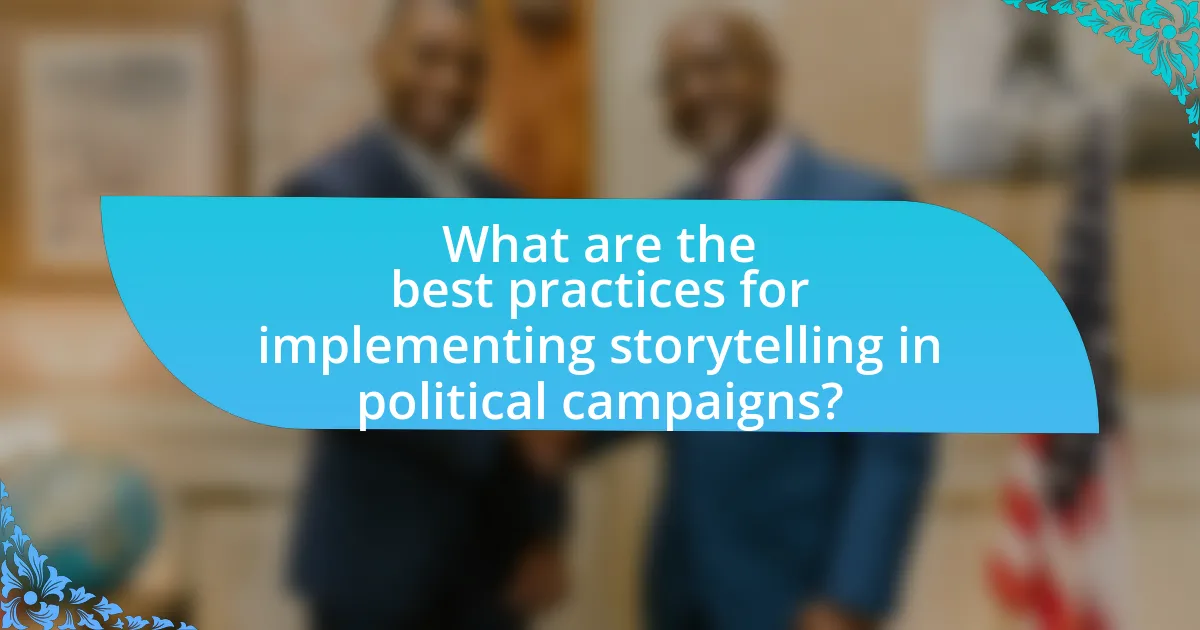
What are the best practices for implementing storytelling in political campaigns?
The best practices for implementing storytelling in political campaigns include crafting a relatable narrative, utilizing emotional appeal, and ensuring consistency across all platforms. Crafting a relatable narrative allows candidates to connect with voters on a personal level, making their messages more impactful. Emotional appeal engages voters’ feelings, which can significantly influence their decision-making process; studies show that emotionally charged messages are more memorable and persuasive. Consistency across platforms reinforces the campaign’s message and builds trust, as voters are more likely to support candidates whose stories remain coherent and aligned throughout various media.
How can candidates craft compelling narratives?
Candidates can craft compelling narratives by focusing on authenticity, relatability, and emotional resonance. Authenticity ensures that the narrative reflects the candidate’s true values and experiences, which builds trust with the audience. Relatability allows voters to see themselves in the candidate’s story, making it more engaging. Emotional resonance connects with voters on a deeper level, often through personal anecdotes or shared experiences that evoke feelings. Research indicates that narratives that incorporate these elements can significantly enhance voter engagement and support, as evidenced by successful campaigns that utilized storytelling effectively, such as Barack Obama’s 2008 presidential campaign, which emphasized personal stories and collective aspirations.
What techniques can enhance the authenticity of a candidate’s story?
Techniques that can enhance the authenticity of a candidate’s story include personal anecdotes, relatable experiences, and emotional resonance. Personal anecdotes allow candidates to share unique experiences that connect them to their audience, making their narratives more genuine. Relatable experiences help voters see common ground, fostering trust and relatability. Emotional resonance engages the audience on a deeper level, as studies show that stories evoking emotions are more memorable and persuasive. For instance, a candidate discussing their struggles with healthcare can create a powerful connection with voters facing similar issues, thereby reinforcing the authenticity of their story.
How can storytelling be used to address key issues effectively?
Storytelling can be used to address key issues effectively by creating emotional connections that resonate with audiences, thereby enhancing understanding and engagement. For instance, political campaigns often utilize personal narratives to illustrate complex policy issues, making them relatable and easier to comprehend. Research by the Stanford Graduate School of Business indicates that stories can increase information retention by up to 22 times compared to facts alone. This demonstrates that storytelling not only captures attention but also facilitates deeper cognitive processing of important issues, leading to more informed public discourse.
What role does audience engagement play in storytelling?
Audience engagement is crucial in storytelling as it fosters a connection between the storyteller and the audience, enhancing the impact of the narrative. Engaged audiences are more likely to remember and resonate with the story, which is particularly important in political campaigns where emotional appeal can influence voter behavior. Research indicates that stories that evoke emotional responses can increase message retention by up to 65%, demonstrating that audience engagement directly correlates with the effectiveness of storytelling in conveying political messages.
How can candidates encourage voter participation through storytelling?
Candidates can encourage voter participation through storytelling by sharing relatable personal narratives that resonate with the electorate’s experiences and values. This approach humanizes candidates, making them more approachable and trustworthy, which can lead to increased voter engagement. Research indicates that stories can evoke emotional responses, making political messages more memorable; for instance, a study by the Stanford Graduate School of Business found that narratives can significantly enhance the persuasiveness of a message. By effectively utilizing storytelling, candidates can create a sense of community and urgency around voting, motivating individuals to participate in the electoral process.
What feedback mechanisms can improve storytelling efforts?
Feedback mechanisms that can improve storytelling efforts include audience surveys, focus groups, and social media analytics. Audience surveys provide direct insights into how the narrative resonates with the target demographic, allowing for adjustments based on preferences and perceptions. Focus groups facilitate in-depth discussions that reveal emotional responses and areas for enhancement in storytelling techniques. Social media analytics offer quantitative data on engagement metrics, such as shares and comments, which indicate the effectiveness of the story in reaching and impacting the audience. These mechanisms collectively enable storytellers to refine their narratives, ensuring they align with audience expectations and enhance overall campaign effectiveness.
What are the common mistakes to avoid in political storytelling?
Common mistakes to avoid in political storytelling include lacking authenticity, failing to connect emotionally with the audience, and being overly complex in messaging. Authenticity is crucial; when politicians present inauthentic narratives, they risk losing credibility, as seen in the backlash against candidates who appear disingenuous. Emotional connection is vital; stories that do not resonate emotionally often fail to engage voters, as evidenced by campaigns that overlook personal narratives in favor of dry statistics. Additionally, overly complex messaging can confuse audiences, leading to disengagement; successful political stories are typically clear and straightforward, allowing voters to easily grasp the message.
How can candidates ensure their stories remain relevant and relatable?
Candidates can ensure their stories remain relevant and relatable by aligning their narratives with the current concerns and values of their target audience. This involves actively listening to constituents, understanding their needs, and incorporating real-life experiences that resonate with those issues. For instance, a candidate discussing healthcare should share personal anecdotes or testimonials that reflect the struggles and triumphs of individuals within the community, thereby creating an emotional connection. Research shows that stories that evoke empathy and reflect shared experiences are more likely to engage voters, as evidenced by a study from the University of California, which found that narratives significantly influence public opinion when they align with the audience’s values and experiences.
What strategies can mitigate backlash from storytelling missteps?
To mitigate backlash from storytelling missteps in political campaigns, employing transparent communication and proactive engagement strategies is essential. Transparent communication involves acknowledging the misstep promptly and providing a clear explanation to the audience, which can help rebuild trust. Proactive engagement includes actively listening to feedback from constituents and addressing their concerns, demonstrating that the campaign values their perspectives. Research indicates that campaigns that engage in open dialogue with their audience can reduce negative sentiment by up to 30%, as seen in studies conducted by the Pew Research Center. By implementing these strategies, political campaigns can effectively navigate the repercussions of storytelling errors.
